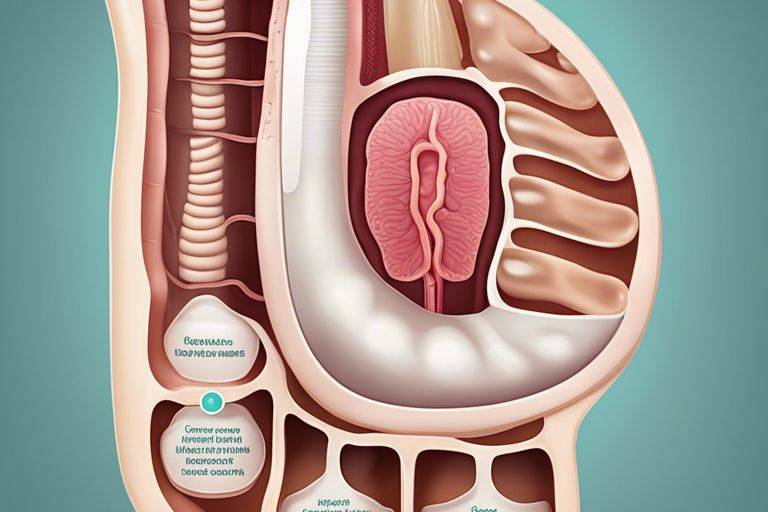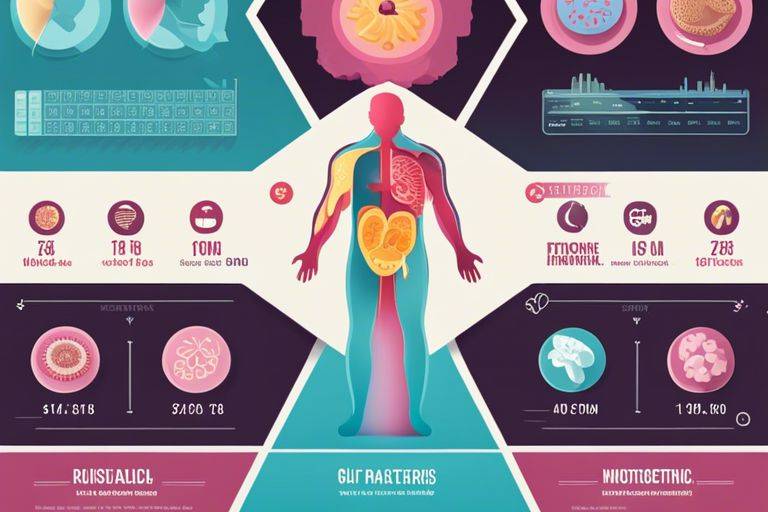Just as a house needs a strong foundation to remain sturdy, your gut is the cornerstone of your overall health. In this detailed guide, I will take you on a journey through the intricate anatomy of your gastrointestinal system. By understanding how your gut works and the necessary roles it plays in your well-being, you can make informed choices to nurture and protect this vital part of your body.
Key Takeaways:
- Gut Microbiome: The gut is home to a complex community of microbes that play a crucial role in our health.
- Gut Anatomy: Understanding the structure of the gut, including the small and large intestines, can help in understanding its functions.
- Intestinal Barrier: The gut lining serves as a barrier that regulates what enters the bloodstream and plays a key role in immunity.
- Microbiota Diversity: A diverse microbiota is vital for maintaining gut health and overall well-being.
- Gut-Brain Connection: The gut and brain communicate bidirectionally through the gut-brain axis, impacting mood, behavior, and cognition.
- Impact of Diet: Diet has a significant influence on gut health, shaping the composition of the gut microbiota and overall digestive function.
- Gut Health Maintenance: Supporting gut health through a balanced diet, probiotics, prebiotics, and lifestyle changes can contribute to overall wellness.
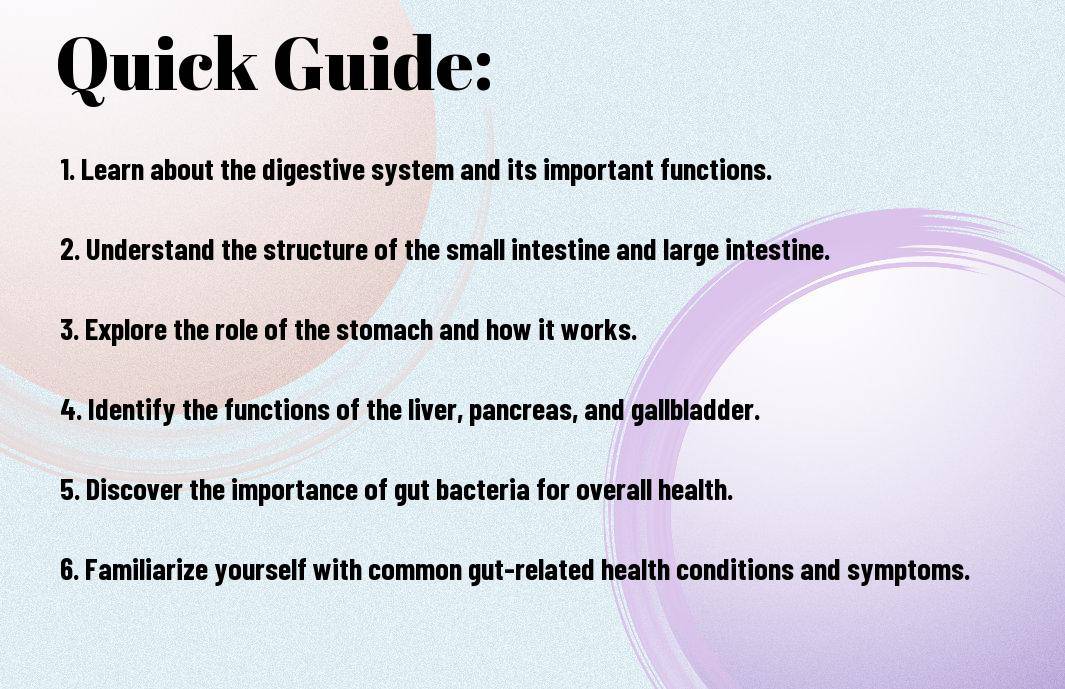
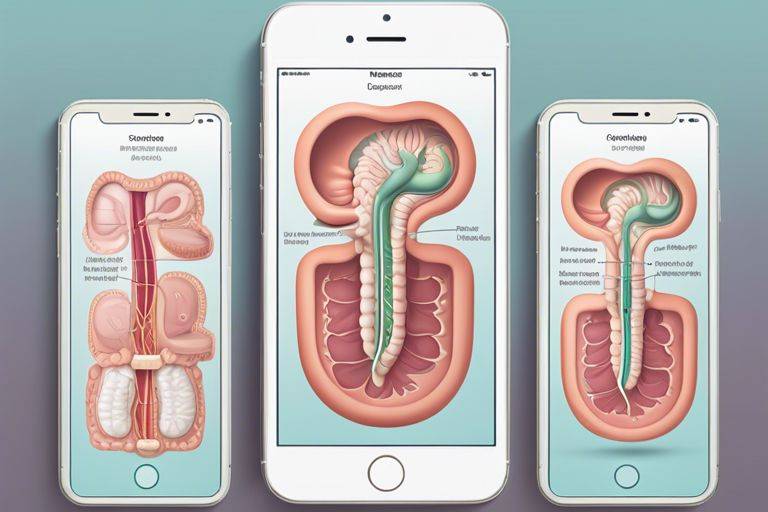
Understanding the Gut Anatomy
To understand the anatomy of your gut, it’s crucial to examine into the intricacies of the Digestive System: Function, Organs & Anatomy. This system plays a vital role in breaking down food, absorbing nutrients, and eliminating waste from your body.
The Structure of the Gut
One of the key aspects of your gut anatomy is its structure. The gut is divided into different sections, including the esophagus, stomach, small intestine, and large intestine. Each section performs specific functions in the digestion and absorption processes.
The Gut Wall Layers
Structure-wise, the gut wall consists of several layers with distinct roles. The layers include the mucosa, submucosa, muscularis externa, and serosa. These layers work together to facilitate digestion, absorption, and movement of food through your gastrointestinal tract.
Wall – The mucosa is the innermost layer that absorbs nutrients, the submucosa contains blood vessels and nerves, the muscularis externa helps with peristalsis, and the serosa protects and supports the gut.
The Gut-Brain Axis
GutBrain – Your gut and brain are intricately connected through the gut-brain axis. This bidirectional communication system allows your gut to send signals to your brain, influencing various aspects of your health and well-being.
For instance, this connection plays a crucial role in regulating your mood, appetite, immune function, and even stress response. Keeping your gut healthy is important for maintaining a balanced gut-brain axis and overall wellness.
Types of Gut Bacteria
Any understanding of the gut would be incomplete without delving into the different types of bacteria that reside within it. These bacteria can be broadly classified as beneficial and harmful, each playing a unique role in maintaining the health of your gut. For more detailed information on the gut and its functions, you can refer to Your Digestive System & How it Works – NIDDK.
| Beneficial Bacteria | Harmful Bacteria |
Beneficial Bacteria
Even though you may not be aware of them, beneficial bacteria are the unsung heroes of your gut. They help in digesting food, producing necessary vitamins, and maintaining a healthy balance within your digestive system.
Harmful Bacteria
Clearly, not all bacteria in your gut are beneficial. Harmful bacteria can disrupt the delicate balance of your gut flora, leading to issues such as bloating, diarrhea, and even more severe gastrointestinal conditions.
With harmful bacteria present in your gut, it is crucial to support the growth of beneficial bacteria to maintain a healthy balance. Any disruption in this balance can lead to various digestive problems.
The Importance of Balance
One key aspect of gut health is ensuring a proper balance between the beneficial and harmful bacteria. This balance is necessary for optimal digestion, absorption of nutrients, and overall well-being. It is crucial to nurture the growth of beneficial bacteria while keeping harmful bacteria in check.
Another important point to remember is that an imbalance in gut bacteria, known as dysbiosis, can have far-reaching consequences beyond digestive issues. It can impact your immune system, mood, weight, and even contribute to chronic inflammatory conditions.
Factors Affecting Gut Health
Many factors can influence the health of your gut and overall digestive system. Understanding these influences is crucial in maintaining a healthy gut. Here are some key factors that can affect your gut health:
- Diet and Nutrition
- Lifestyle Choices
- Environmental Factors
- Medications and Supplements
Diet and Nutrition
Even the most intricate system can be disrupted by what you eat. Your diet plays a significant role in your gut health. Foods rich in fiber, probiotics, and prebiotics can promote a healthy balance of gut bacteria, while processed foods, high sugar diets, and artificial additives can harm your gut flora. Ensuring a diverse and nutritious diet is important for gut health.
Lifestyle Choices
Factors like stress, lack of sleep, and excessive alcohol consumption can negatively impact your gut health. Stress, in particular, can lead to an imbalance in gut bacteria and affect digestion. Incorporating stress management techniques, prioritizing sleep, and moderating alcohol intake can significantly benefit your gut health.
Environmental Factors
Nutrition, pollution, and exposure to toxins are environmental factors that can influence your gut health. Ensuring you have access to clean water, consuming organic produce, and avoiding polluted environments can contribute to a healthier gut. This shows the importance of maintaining a clean and toxin-free environment for your digestive system.
- Organic produce
- Clean water sources
- Minimizing exposure to pollutants and toxins
Diet, pollution, and toxins in your environment can directly impact the delicate balance of your gut microbiome. Avoiding processed foods, pesticides, and pollutants can help maintain a healthy gut ecosystem. This underscores the significance of a clean environment in supporting optimal gut health.
Medications and Supplements
Assuming medications without consideration of their impact on your gut health can disrupt the balance of your digestive system. Certain medications like antibiotics, proton pump inhibitors, and nonsteroidal anti-inflammatory drugs (NSAIDs) can have adverse effects on your gut flora. Plus, overuse of supplements can also lead to imbalances in your gut microbiota.
Plus, it’s crucial to consult with a healthcare provider before taking any new medications or supplements to ensure they won’t harm your gut health. Your gut is a delicate ecosystem that can be easily disrupted, so it’s important to be mindful of what you put into your body.

Tips for Maintaining a Healthy Gut
Once again, maintaining a healthy gut is crucial for overall well-being. Here are some tips to help you keep your gut in top shape:
- Dietary Changes: Any drastic changes in your diet should be made gradually to allow your gut microbiota to adjust.
- Probiotics and Prebiotics: Tips and tricks for incorporating probiotic– and prebiotic-rich foods into your diet can help promote a healthy gut flora.
- Stress Management Techniques: Little habits like mindfulness, meditation, or yoga can go a long way in reducing stress levels and supporting your gut health.
- Exercise and Physical Activity: Management of a consistent exercise routine can help in maintaining a healthy gut and overall well-being.
Dietary Changes
Any drastic changes in your diet should be made gradually to allow your gut microbiota to adjust.
Probiotics and Prebiotics
Tips and tricks for incorporating probiotic- and prebiotic-rich foods into your diet can help promote a healthy gut flora.
Stress Management Techniques
Little habits like mindfulness, meditation, or yoga can go a long way in reducing stress levels and supporting your gut health.
Exercise and Physical Activity
Management of a consistent exercise routine can help in maintaining a healthy gut and overall well-being.
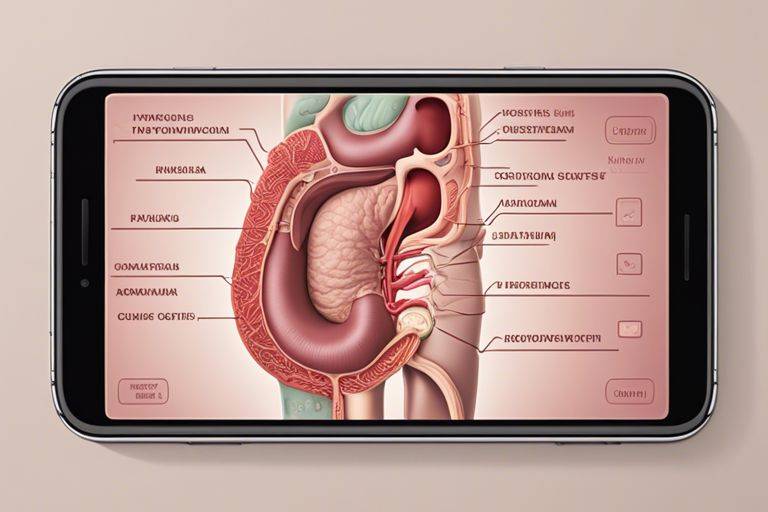
A Step-by-Step Guide to Improving Gut Health
All the information you need to improve your gut health is right here. By following this step-by-step guide, you can make positive changes to support your gut and overall well-being.
Identifying Gut Imbalances
To begin your journey to better gut health, it’s crucial to identify any imbalances that may be present. Symptoms like bloating, gas, irregular bowel movements, and food sensitivities can indicate an imbalance in your gut flora.
Creating a Personalized Gut Health Plan
Personalized gut health plans are crucial because what works for one person may not work for another. By understanding your unique health needs and goals, you can tailor a plan that addresses your specific gut issues.
For instance, if you have been experiencing bloating and gas after consuming dairy products, you may benefit from eliminating dairy from your diet for a period to see if your symptoms improve.
Implementing Dietary Changes
Implementing dietary changes is a key component of improving gut health. By removing processed foods, sugars, and artificial ingredients from your diet, you can support a healthy gut microbiome and reduce inflammation in your digestive system.
Imbalances in the gut can lead to a variety of health issues, including autoimmune conditions, allergies, and mood disorders.
Managing Stress and Anxiety
With the fast-paced nature of modern life, stress and anxiety can take a toll on your gut health. Chronic stress can disrupt the balance of bacteria in your gut and lead to inflammation, which in turn affects your overall well-being.
Plus, incorporating stress-reducing activities like yoga, meditation, or spending time in nature can have a positive impact on your gut health.
The Pros and Cons of Gut Health Supplements
Your gut health is crucial to your overall well-being, and sometimes, you might need a little extra help to maintain it. Gut health supplements can be beneficial, but they also come with their own set of pros and cons. Let’s break it down:
| Pros | Cons |
| May improve digestion | Possible mild side effects |
| Can boost immune system | Not regulated by FDA |
| May reduce inflammation | Costly in the long run |
| Can restore gut flora balance | Interactions with medications |
| News – A Beginners Guide to Gut Health | Effectiveness varies |
Benefits of Probiotics
Benefits: Probiotics are live bacteria that can provide numerous benefits by improving gut health, aiding in digestion, and boosting the immune system.
Risks and Side Effects
There’s always a possibility of experiencing risks and side effects when taking gut health supplements, especially if you have underlying health conditions or allergies. Common side effects include bloating, gas, and mild digestive discomfort.
It’s vital to consult with a healthcare provider before starting any supplement regimen to ensure it’s safe for you. Some supplements may interact with medications or exacerbate pre-existing conditions. Additionally, the quality and effectiveness of supplements can vary, so it’s crucial to choose reputable brands.
Choosing the Right Supplement
To ensure you are selecting the right gut health supplement for your needs, consider factors such as the specific strains of bacteria present, the dosage, and the form of the supplement. Look for products that have been tested for purity and potency by third-party organizations to guarantee their quality.
SideNote: Always consult a healthcare professional before adding any new supplement to your routine, especially if you have any underlying health conditions or concerns. Your gut health is vital, so make informed choices when it comes to supplementing it.
Conclusion
Now that I’ve walked you through the intricate anatomy of your gut, I hope you have a better understanding of how this complex system works. Recall, your gut plays a crucial role in your overall health and well-being, so taking care of it should be a top priority. By making mindful choices about your diet and lifestyle, you can support a healthy gut and ultimately, a healthier you.
FAQ
Q: What is the gut microbiome?
A: The gut microbiome refers to the collection of microorganisms that live in the digestive tract, including bacteria, viruses, fungi, and other microorganisms.
Q: Why is the gut microbiome important?
A: The gut microbiome plays a crucial role in various functions such as digestion, immune system regulation, and the production of imperative nutrients.
Q: How does the gut communicate with the brain?
A: The gut-brain axis is a bidirectional communication system between the gut and the central nervous system, involving neural, hormonal, and immunological pathways.
Q: What are the factors that can influence the gut microbiome?
A: Diet, lifestyle, medications, stress, genetics, and environmental factors can all impact the composition and diversity of the gut microbiome.
Q: How can I improve the health of my gut microbiome?
A: Consuming a diverse range of plant-based foods, incorporating probiotics and prebiotics into your diet, reducing stress, and getting regular exercise can all help improve the health of your gut microbiome.
Q: What are some signs of an unhealthy gut microbiome?
A: Symptoms of an unhealthy gut microbiome may include digestive issues, food intolerances, frequent infections, fatigue, mood swings, and skin problems.
Q: Can I test the health of my gut microbiome?
A: Yes, there are tests available that can analyze the composition of your gut microbiome and provide insights into its overall health. These tests can help identify any imbalances or dysbiosis that may be present.
